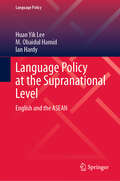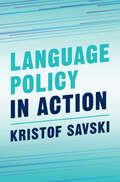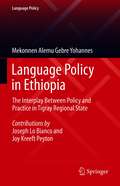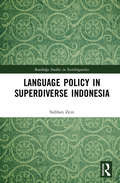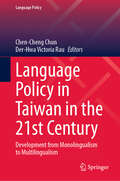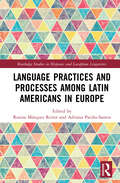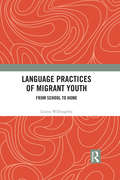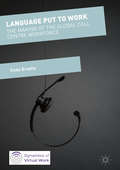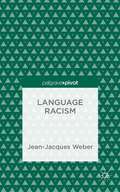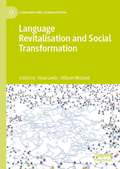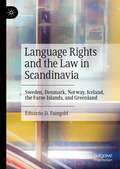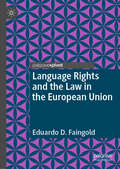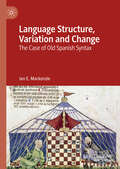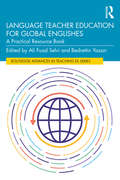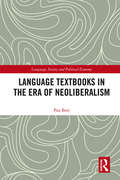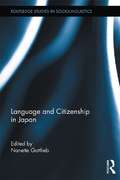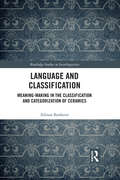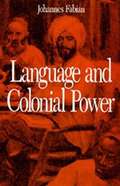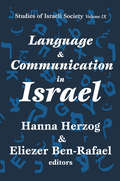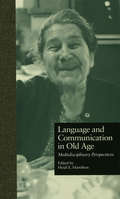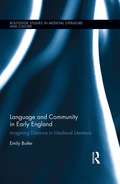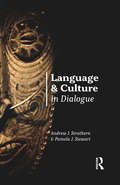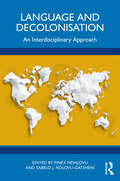- Table View
- List View
Language Policy at the Supranational Level: English and the ASEAN (Language Policy #37)
by Ian Hardy M. Obaidul Hamid Huan Yik LeeThis book provides a critical examination of the English-only policy of ASEAN, the Association of the ten Southeast Asian nations. It presents the ASEAN language policy and planning (LPP) journey through time: rationalising English as the sole working language for ASEAN in the past, followed by a critique of the status quo considering regional complexities and dynamics, and finally exploring alternative linguistic futures for ASEAN and the Southeast Asian region. The book also offers methodological innovations in LPP research by utilising the largely underrepresented and undervalued agency of 'people with expertise'. The authors argue for a multilingual commitment towards pursuing an agency of 'projectivity' in co-constructing imagined LPP possibilities to reflect the region's socio-historical context, socio-political intricacies, and socio-linguistic diversity. The way forward is a more inclusive, equitable, balanced, and responsible approach to LPP, both regionally and globally. The book engages with both deconstructive and constructive paradigms, offering promising proposals for dealing with key language issues and contemporary challenges. This book will be interesting reading for language and education scholars, sociolinguists, historians, political scientists, policymakers, diplomats, language activists, media personnel, business leaders, tourism players and other language policy and planning actors operating at national, sub-national and supra-national levels.
Language Policy in Action
by Kristof SavskiLanguage is part of social life, and efforts to control it can be viewed in light of broader struggles for social power around issues like migration, education, class and race. This book explores how people act within institutions and communities to try and control the language of others. It conceptualises language policy as a form of discourse management, involving attempts to reorder hierarchies of knowledge, reframe social relationships, control what identities and ideologies may be expressed, and limit who can access particular social spaces. Real-life case studies are included, allowing readers to understand the functioning of language policy in different contexts. A holistic framework is also introduced, showing how language policies are enacted though five key actions: creating, debating, interpreting, enforcing and resisting. Each action is explained with reference to current theories in applied linguistics and sociolinguistics, and methodological suggestions, discussion questions and examples of further reading are also provided.
Language Policy in Ethiopia: The Interplay Between Policy and Practice in Tigray Regional State (Language Policy #24)
by Mekonnen Alemu YohannesThis book examines the interplay and tensions between hegemonic and counter-hegemonic language policy and processes in Tigray, a regional state of Ethiopia, in the period of pre- and post-1991. Viewing language use and language policy as dynamic social and ideological processes, the book presents Ethiopia as an example of language policy creation and implementation over time, in a highly volatile political context. The case of Ethiopia is unique in that different language policies and practices were put in place as the country’s leaders changed through political takeovers. Declared language policies were not always implemented, and those implemented were often protested. The book starts with an overview and review of language policy and planning, followed by a chapter on the history of such planning in Ethiopia. It then presents the methodology used for the study, and examines the appropriation of hegemonic LPP, patterns of resistance, schools and public sites as centers of resistance, and the emergence and development of specific patterns of language use in different regions of the country. The book ends with recommendations for future research, and draws the overall conclusion that since LPP is a dynamic and multilayered contextual process, official or de facto language policy is often undermined by overt or covert unofficial language policies, ideologies, mechanisms, and agents that result in different patterns of language use.
Language Policy in Superdiverse Indonesia (Routledge Studies in Sociolinguistics)
by Subhan ZeinIndonesia has an extreme diversity of linguistic wealth, with 707 languages by one count, or 731 languages and more than 1,100 dialects in another estimate, spoken by more than 600 ethnicities spread across 17,504 islands in the archipelago. Smaller, locally used indigenous languages jostle for survival alongside Indonesian, which is the national language, regional lingua francas, major indigenous languages, heritage languages, sign languages and world languages such as English, Arabic and Mandarin, not to mention emerging linguistic varieties and practices of language mixing. How does the government manage these languages in different domains such as education, the media, the workplace and the public while balancing concerns over language endangerment and the need for participation in the global community? Subhan Zein asserts that superdiversity is the key to understanding and assessing these intricate issues and their complicated, contested and innovative responses in the complex, dynamic and polycentric sociolinguistic landscape of Indonesia that he conceptualises as superglossia. This offers an opportunity for us to delve more deeply into such a context through the language and superdiversity perspective that is in ascendancy. Zein examines emerging themes that have been dominating language policy discourse including status, prestige, corpus, acquisition, cultivation, language shift and endangerment, revitalisation, linguistic genocide and imperialism, multilingual education, personnel policy, translanguaging, family language policy and global English. These topical areas are critically discussed in an integrated manner against Indonesia’s elaborate socio-cultural, political and religious backdrop as well as the implementation of regional autonomy. In doing so, Zein identifies strategies for language policy to help inform scholarship and policymaking while providing a frame of reference for the adoption of the superdiversity perspective on polity-specific language policy in other parts of the world.
Language Policy in Taiwan in the 21st Century: Development from Monolingualism to Multilingualism (Language Policy #38)
by Der-Hwa Victoria Rau Chen-Cheng ChunThis book provides insiders' views of how Taiwan's monolingual language policy has evolved into multilingual language policies since its peaceful transition to a democratic society in the late 20th century. From three major perspectives, it examines the conflicts and compromises of monolingual and multilingual ideologies, challenges and approaches in language management, and actual language practice in families and communities in the transformation process in the last three decades. The book intends to theorize Taiwan's multilingual experience and introduce it to the international scholarly community, who are more familiar with the monolingual development on the other side of the Taiwan Strait and less aware of the multilingual development in Taiwan. It is an eye-opening book for language planning and policy students, language educators, public policymakers, and all those with a stake in multilingualism.
Language Politics and Policies: Perspectives from Canada and the United States (Impact: Studies In Language, Culture And Society Ser. #6)
by Thomas RicentoTensions and conflicts related to linguistic identity and security are inevitable - even necessary - in liberal democracies. However, if conflicts related to language and identity negatively impact democratic participation, and lead to social fragmentation, civic withdrawal, and lack of trust in societal institutions, then the political system itself may become suspect and unstable. Written by experts from the fields of sociolinguistics, bilingual studies, political science/philosophy, and education, this volume provides a comprehensive picture of the current political, cultural and social factors impacting language policy in the United States and Canada. The chapters cover many aspects of social life in North America, such as immigration, bilingual education, heritage languages, and linguistic identity, and explore the challenges and set-backs, along with the many positive steps taken in recent years to advance the values of inclusion amidst diversity in a variety of contexts and domains in the United States and Canada.
Language Power (Language in Social Life)
by Norman FaircloughLanguage and Power is widely recognized both as a classic and an essential introductory textbook to the field of Critical Discourse Analysis. It focusses on how language functions in maintaining and changing power relations in modern society, the ways of analyzing language which can reveal these processes and how people can become more conscious of them, as well as, more able to resist and change them. <p><p>In this twenty-fifth anniversary edition, Norman Fairclough includes a substantial new introduction and brings the discussion up-to-date. He shows both the importance of the book in the development of critical discourse analysis over the past three decades and how language and power relations have changed due to major socio-economic changes. <p><p>It remains vital reading for all students of discourse analysis, critical discourse analysis and other related courses.
Language Practices and Processes among Latin Americans in Europe (Routledge Studies in Hispanic and Lusophone Linguistics)
by Rosina Márquez Reiter and Adriana Patiño-SantosLanguage Practices and Processes among Latin Americans in Europe is an innovative and thematically organised collection of studies dedicated to contemporary sociolinguistic research on Latin Americans across European contexts. This book captures some of the language practices and experiences of Spanish-speaking Latin Americans (SsLAs) across various regions in Europe, addressing language uses, language ideologies, and experiences with languages in particular geographical contexts and settings across the ten chapters. The book provides a new lens to study the sociolinguistics of the migratory trajectories of Spanish-speaking Latin American migrants and the situated practices and processes in which they participate in their host societies. The comprehensive volume will be of interest to researchers in the area of Spanish sociolinguistics, sociology of language, and language ideology.
Language Practices of Migrant Youth: From School to Home
by Louisa WilloughbyThis ground breaking research explores language maintenance and shift focusing on a school community. Following students’ language practice inside and outside of school, the author offers a full picture of students’ multilingual practices and their role in shaping identity. Using case studies of eight girls from Vietnamese and Cambodian backgrounds, the book draws on data from questionnaires, interviews and ethnographic observation to bring these language practices to life. It explores the place of heritage languages, English and other languages in the girls’ repertoires and investigates the role they see for these languages in their lives. A key focus of the book is the role of the school environment in shaping students’ repertoires and unfolding sense of ethnic identity; both directly through formal instruction and indirectly through its ethos and social composition. It provides practical suggestions on the basis of extensive research for how schools can negotiate some of the challenges of catering to a multiethnic population. Essential reading for anyone researching migrant language practice, sociolinguistics or multicultural education.
Language Put to Work: The Making of the Global Call Centre Workforce (Dynamics of Virtual Work)
by Enda BrophyWINNER of The Gertrude J. Robinson Book Prize, awarded by the Canadian Communication Association, and the Canadian Association of Work and Labour Studies, Book of the Year Award. This book examines the striking rise of call centres over the past quarter century through the lens of the resistance and collective organizing generated by workers along the digital assembly lines. Drawing on field research in Atlantic Canada, Ireland, Italy, and New Zealand, Enda Brophy investigates the contested making of the transnational call centre workforce and its integration into the circuits of global capitalism. Moving beyond depictions of call centre labour as either entirely liberated or utterly subordinated, Language Put to Work inquires into the forms of work refusal and insubordination provoked by the spread of these communicative workplaces, including informal strategies of quitting, slacking and sabotage, conventional trade union activity, tactical innovations at the margins of the labour movement, and forms of self-organization forged by workers outside of the established trade union movement. Weaving rich empirical evidence together with political-economic analysis and theories of resistance, this book argues that the submission of language to the production of value in the call centre is a process of proletarianization rather than professionalization, and that the new working class has widely opposed this transformation.
Language Racism
by Jean-Jacques WeberThis book discusses a new breed of racism, namely language racism, which is spreading both in the USA and in Europe, as well as other parts of the world. The book is a manifesto promoting a more positive view of linguistic and cultural diversity.
Language Revitalisation and Social Transformation (Language and Globalization)
by Huw Lewis Wilson McLeodThis book brings together an interdisciplinary group of academic researchers in order to examine how and to what extent the challenge of language revitalisation should be reassessed and reconceptualised to take account of our fast-changing social context. The period of four decades between 1980 and 2020 that straddled the end of the twentieth century and the beginning of the twenty-first is widely regarded as one that witnessed a series of fundamental social, economic and political transformations. Many societies have become increasingly individualistic, mobile and diverse in terms of ethnicity and identity; their economies have become increasingly interconnected; and their governance structures have become increasingly complex, incorporating a growing number of different levels and actors. In addition, rapid advancements with regard to automated, digital and communication technology have had a far-reaching impact on how people interact with each other and participate in society. The chapters in this book aim to advance an agenda of key questions that should concern those working in the field of language revitalisation over the coming years, and the volume will be of interest to students, scholars and policy-makers in related areas including sociolinguistics, education, sociology, geography, political science, law, economics, Celtic studies, and communication technology.
Language Rights and the Law in Scandinavia: Sweden, Denmark, Norway, Iceland, the Faroe Islands, and Greenland
by Eduardo D. FaingoldThis book examines the language policies in the constitutions, legal statutes, and regulations of Sweden, Denmark, Norway, Iceland, the Faroe Islands, and Greenland. In these countries and territories, modern descendants of Old Norse (North Germanic) are spoken today: Swedish, Danish, Norwegian, Icelandic, and Faroese. In addition, there are regions of Scandinavia where speakers of minority languages were conquered or incorporated, with their languages suppressed or neglected, as well as recent developments in the status and use of English, and immigrant populations who do not speak a Scandinavian language as their native language. This book adopts a comparative approach to trace the development of language policies and rights in Scandinavia, and it will be of interest to students as well as scholars of European and Scandinavian studies, applied linguistics, sociolinguistics, education, political science, and law.
Language Rights and the Law in the European Union
by Eduardo D. FaingoldThis book examines the language policies relating to linguistic rights in European Union law and in the constitutions and legal statutes of some European Union member states. In recent years, the European Union has seen an increase in claims for language recognition by minority groups representing a considerable population (such as Catalan in Spain and Welsh in the UK). Additionally, there is a developing situation surrounding the official use of English within the European Union in the aftermath of the Brexit vote. In light of these two contexts, this book focuses on the degree of legal protection afforded to linguistic groups in the European Union. It will be of interest to students and scholars of language policy, EU law, minority languages and sociolinguistics.
Language Structure, Variation and Change: The Case of Old Spanish Syntax
by Ian E. MackenzieThis book offers an original account of the dynamics of syntactic change and the evolving structure of Old Spanish that combines rigorous manuscript-based investigation, quantitative analysis and a syntactic approach grounded in Minimalist thinking. Its analysis of both successful and failed changes demonstrates the degree of unpredictability caused by the interaction of competing factors and will shed fresh light on the assumed unidirectionality of linguistic change. Importantly, it reveals that Old Spanish and modern Spanish are more similar to one another than is usually supposed and demonstrates that many of the differences between the two varieties are quantitative rather than qualitative. This theoretically sophisticated examination of historical corpora will provide an invaluable resource for students and scholars of Old and modern Spanish, historical linguistics, sociolinguistics and syntax.
Language Teacher Education for Global Englishes: A Practical Resource Book (Routledge Advances in Teaching English as an International Language Series)
by Ali Fuad SelviThis practical resource book showcases both the theory and practical application for teacher educators in diverse contexts bringing a global Englishes perspective into their teacher education courses, both at pre- and in-service levels. The recent Global Englishes paradigm serves as a promising response to the complexity of identity, interaction, use, and instruction surrounding the English language. It is increasingly important to enhance teachers’ knowledge base—their specialized knowledge, skills, competencies, and commitments—vis-à-vis the changing needs of English Language Teaching. The chapters in the book provide accessible theoretical orientation to different aspects of the Global Englishes paradigm, from instructional materials to language assessment, and are complemented by a range of practical applications that promote teacher development. The volume is recommended as a viable professional development resource for teacher educators who are looking for activities and resources in preparing teachers for diverse teaching contexts, realities, affordances, and constraints.
Language Textbooks in the era of Neoliberalism (Language, Society and Political Economy)
by Pau BoriThis book examines how neoliberalism finds expression in foreign language textbooks. Moving beyond the usual focus on English, Pau Bori explores the impact of neoliberal ideology on Catalan textbooks. By comparing Catalan textbooks to English textbooks, this book interrogates the similarities and differences between a minor and a global language in the age of neoliberalism. Drawing on insights from critical theory and critical pedagogy, this study provides a fresh perspective on foreign language textbooks and second language education more broadly. Language Textbooks in the Era of Neoliberalism paves the way for new critical perspectives in language education that will challenge the current hegemony of neoliberalism.
Language and Citizenship in Japan (Routledge Studies in Sociolinguistics)
by Nanette GottliebThe relationship between language and citizenship in Japan has traditionally been regarded as a fixed tripartite: ‘Japanese citizenship’ means ‘Japanese ethnicity,’ which in turn means ‘Japanese as one’s first language.’ Historically, most non-Japanese who have chosen to take out citizenship have been members of the ‘oldcomer’ Chinese and Korean communities, born and raised in Japan. But this is changing: the last three decades have seen an influx of ‘newcomer’ economic migrants from a wide range of countries, many of whom choose to stay. The likelihood that they will apply for citizenship, to access the benefits it confers, means that citizenship and ethnicity can no longer be assumed to be synonyms in Japan. This is an important change for national discourse on cohesive communities. This book’s chapters discuss discourses, educational practices, and local linguistic practices which call into question the accepted view of the language-citizenship nexus in lived contexts of both existing Japanese citizens and potential future citizens. Through an examination of key themes relating both to newcomers and to an older group of citizens whose language practices have been shaped by historical forces, these essays highlight the fluid relationship of language and citizenship in the Japanese context.
Language and Classification: Meaning-Making in the Classification and Categorization of Ceramics (Routledge Studies in Sociolinguistics)
by Allison BurketteThis volume adopts a practice-based approach to examine the different ways in which classification is communicated and negotiated in different environments within archaeology. The book looks specifically at the archaeological classification of ceramics as a lens through which to examine the discursive and social practices inherent in the classification and categorization process, with perspectives from such areas as corpus linguistics, discourse analysis, linguistic anthropology, and archaeology forming the foundation of the book’s theoretical framework. The volume then looks at the process of classification in practice in a variety of settings, including a university course on ceramics classification, an archaeological field school, an intensive petrography course, and archaeometry laboratory at a nuclear research reactor, and highlights participant observation and audiovisual data taken from fieldwork practice completed in these environments. This volume offers a valuable contribution to the growing literature on language and material culture, making this a key resource for students and scholars in sociolinguistic, anthropological linguistics, archaeology, discourse analysis, and anthropology.
Language and Colonial Power: The Appropriation of Swahili in the Former Belgian Congo, 1880-1938
by Johannes FabianAmong the preconditions for establishing colonial authority was communication with the colonised. Verbal exchanges depended on a shared communicative praxis providing common ground on which unilateral claims could be imposed. Use of, and control over, verbal means of communication were needed to maintain regimes - military, religious-ideological, economic - in power. In the Belgian Congo brutal physical force never ceased to be exercised. In this study Professor Fabian examines the more subtle uses of power through controls on communication, by looking at the history of Swahili as it spread from the East Coast to Central Africa and demonstrating connections between -changing forms of colonial power and the development of policies towards Swahili. Using a wide range of sources, including numerous and sometimes obscure vocabularies, he combines concepts derived from literary theory and sociolinguistics to uncover, through the flaws and failures of these texts, deep-seated attitudes to language and communication.
Language and Communication in Israel (Schnitzer Studies In Israel Society Ser. #Vol. 9)
by Hanna HerzogThis volume presents a broad range of the various approaches and questions that preoccupy Israel's sociologists of language and communication. It covers the relation of language and communication to daily life, to social and cultural pluralism, and to politics and elections.
Language and Communication in Old Age: Multidisciplinary Perspectives (Issues in Aging)
by Heidi E. HamiltonFirst published in 1999. Routledge is an imprint of Taylor & Francis, an informa company.
Language and Community in Early England: Imagining Distance in Medieval Literature
by Emily ButlerThis book examines the development of English as a written vernacular and identifies that development as a process of community building that occurred in a multilingual context. Moving through the eighth century to the thirteenth century, and finally to the sixteenth-century antiquarians who collected medieval manuscripts, it suggests that this important period in the history of English can only be understood if we loosen our insistence on a sharp divide between Old and Middle English and place the textuality of this period in the framework of a multilingual matrix. The book examines a wide range of materials, including the works of Bede, the Alfredian circle, and Wulfstan, as well as the mid-eleventh-century Encomium Emmae Reginae, the Tremulous Hand of Worcester, the Ancrene Wisse, and Matthew Parker’s study of Old English manuscripts. Engaging foundational theories of textual community and intellectual community, this book provides a crucial link with linguistic distance. Perceptions of distance, whether between English and other languages or between different forms of English, are fundamental to the formation of textual community, since the awareness of shared language that can shape or reinforce a sense of communal identity only has meaning by contrast with other languages or varieties. The book argues that the precocious rise of English as a written vernacular has its basis in precisely these communal negotiations of linguistic distance, the effects of which were still playing out in the religious and political upheavals of the sixteenth century. Ultimately, the book argues that the tension of linguistic distance provides the necessary energy for the community-building activities of annotation and glossing, translation, compilation, and other uses of texts and manuscripts. This will be an important volume for literary scholars of the medieval period, and those working on the early modern period, both on literary topics and on historical studies of English nationalism. It will also appeal to those with interests in sociolinguistics, history of the English language, and medieval religious history.
Language and Culture in Dialogue (Criminal Practice Ser.)
by Pamela J. Stewart Andrew J. StrathernIn this book, Andrew J. Strathern and Pamela J. Stewart delineate the relationship between “language in particular” and “culture in general” by focusing on language as both social practice and a means of classifying and interpreting the world. A traditional linguistic approach to a focus on language is illuminated by their anthropological emphasis on the embodiment of relationships and experience. In the book, the body is placed in the foreground for understanding language in culture, which helps in turn to understand how it enables us to adapt to the world of lived material experience. Written in an accessible style and drawing on an extensive corpus of primary field research from Papua New Guinea, Samoa, Japan, Taiwan, Scotland, and Ireland, Strathern and Stewart present a world anthropology which links together European, North American, and Asia-Pacific approaches to the topic. Students and scholars alike of sociocultual anthropology, linguistic anthropology, and linguistics will benefit from this engaging work on how the various components of our culture are informed and shaped through language.
Language and Decolonisation: An Interdisciplinary Approach
by Sabelo J. Ndlovu-Gatsheni Finex NdhlovuLanguage and Decolonisation is the first collection to bring together views from across scholarly communities that are committed to the agenda of decolonising knowledge in language study. Edited by leading figures in the field, the chapters offer new insights on how ‘decolonising’ can be adopted as a methodology for charting the next steps in solving practical language-related problems in educational and related social policy areas. Divided into two sections, the book covers the coloniality of language, the materiality of culture and colonial scripts, the decolonisation imperative, multilingualism discourse and decolonisation, and decolonising languages in public discourse. With 20 chapters authored by experts from across the globe, this pioneering collection is an essential reference and resource for advanced students, scholars, and researchers of language and culture, sociolinguistics, decolonial studies, racial studies, and related areas.
